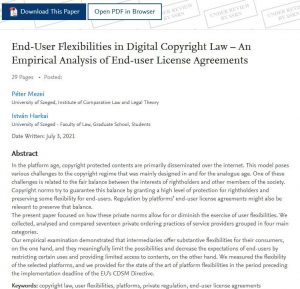End-User Flexibilities in Digital Copyright Law – An Empirical Analysis of End-user License Agreements
Our empirical paper with István Harkai, written within the frames of the reCreating Europe is submitted for publication. We analysed the intersection of EULAs and copyright end-user flexibilities.
 The abstract of our paper reads as follows:
The abstract of our paper reads as follows:
In the platform age, copyright protected contents are primarily disseminated over the internet. This model poses various challenges to the copyright regime that was mainly designed in and for the analogue age. One of these challenges is related to the fair balance between the interests of rightholders and other members of the society. Copyright norms try to guarantee this balance by granting a high level of protection for rightholders and preserving some flexibility for end-users. Regulation by platforms’ end-user license agreements might also be relevant to preserve that balance.
The present paper focused on how these private norms allow for or diminish the exercise of user flexibilities. We collected, analysed and compared seventeen private ordering practices of service providers grouped in four main categories.
Our empirical examination demonstrated that intermediaries offer substantive flexibilities for their consumers, on the one hand, and they meaningfully limit the possibilities and decrease the expectations of end-users by restricting certain uses and providing limited access to contents, on the other hand. We measured the flexibility of the selected platforms, and we provided for the state of the art of platform flexibilities in the period preceding the implementation deadline of the EU’s CDSM Directive.
You can download our paper from the SSRN (click here).
To know more on reCreating Europe, visit our website here.
